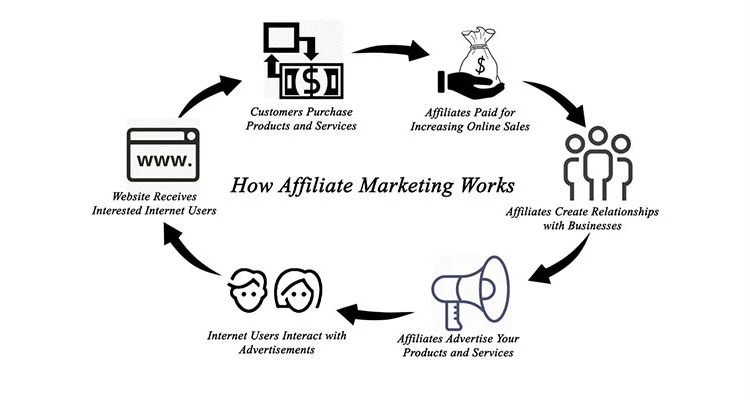The concept of affiliate marketing often leads to raised eyebrows in the legal world. However, once understood and appropriately managed, it can serve as an innovative source of additional income. Is it time to unlock the untapped potential and explore the benefits for your law firm? Let’s explore affiliate marketing for law firms and how to use it successfully.
The Concept of Affiliate Marketing
Simply put, affiliate marketing is a form of promotion where a business pays external parties, often referred to as ‘third-party publishers’, to create leads or traffic to the company’s products or services. These third parties are known as ‘affiliates’, and the commission they receive is usually decided by the company whose products they’re promoting.

For law firms, this could mean partnering with a legal publisher, working with another law firm that specializes in a different area of the law, or partnering with blogs and websites to recommend legal technology solutions, online courses, and more.
The Value for Law Firms
Broadening income streams is the main reason for law firms to consider affiliate marketing. In a competitive marketplace, diversification is the key to financial stability. Traditionally, law firms depend heavily on billable hours and contingent fees. By incorporating affiliate marketing into your firm’s revenue model, you can safeguard it against the unpredictability of the legal market, adding a steady stream of income.
Ensuring Ethical Practice
Affiliate marketing in the legal sphere is a delicate dance between opportunities and ethics. Ensuring ethical practice is a top priority. Every attorney must abide by their jurisdiction’s Rules of Professional Conduct, so it’s important to navigate this terrain with caution.
Don’t shy away from seeking guidance if needed. Consult your local bar association, conduct thorough research, and consider engaging an ethics attorney to ensure your affiliate marketing strategies align with ethical standards.

Strategies to Implement Affiliate Marketing
Identify Relevant Opportunities
If you plan to implement affiliate marketing in your law firm, start by identifying relevant opportunities in line with your firm’s specialization. For example, if your firm handles immigration issues, an affiliate partnership with a language learning platform or travel blog might be beneficial. Or, if your firm specializes in no-knock raids lawsuit cases and police misconduct, consider partnering with victim support agencies or similar. It’s important to only recommend services and products that are useful to your clients and align with your firm’s values.
Next, negotiate the terms of your affiliate relationships. Consider what works best for your firm: a commission per lead, a flat fee for promotion, or a percentage of sales.
Communicating with Clients
Transparency with your clients is paramount. If you are recommending a product or service due to an affiliate relationship, disclose it. This should apply whether you recommend the product within your website content, on your blog, YouTube channel, social media platforms, or anywhere else. Honesty will build trust and preserve the attorney-client relationship.
Tracking Success and Making Adjustments
As you venture into the world of affiliate marketing, it’s vital to assess the effectiveness of your strategies on a regular basis. Utilize analytics tools to track conversions, monitor client engagement, and measure your return on investment. This way, you can make necessary adjustments to your strategies, ensuring they remain beneficial for both your firm and your clients. Regular reviews can also help you identify potential ethical concerns early and address them proactively. Affiliate marketing isn’t a ‘set and forget’ strategy, but rather a dynamic process that requires ongoing attention and refinement.
Growing Your Network
Expanding your network is another significant advantage of affiliate marketing. Partnering with different businesses allows your firm to form connections beyond the legal sphere. It opens avenues for mutually beneficial relationships that could lead to more referrals, co-marketing opportunities, and enhanced credibility within your field. Be strategic about your partnerships and remember that the ultimate goal is to add value for your clients while also expanding your reach.
Engaging and Understanding Your Audience
An integral part of executing a successful affiliate marketing strategy is understanding and engaging with your audience. As a law firm, your clientele can range from individuals to corporations with varying needs and expectations. Identifying their common pain points and requirements can help you choose the right affiliate partners and effectively communicate the value of their products or services.

For example, a firm specializing in family law may find their clients could benefit from counseling services or financial planning tools. Being able to recommend these services as part of your affiliate program not only aids your clients but also strengthens your relationships with them.
Staying Relevant in a Dynamic Environment
With its ever-evolving trends and technologies, the digital world demands that your law firm stays agile and adaptive. As part of your affiliate marketing strategy, ensure that your methods of promotion are current and effective. This could involve updating your website, creating engaging content, or using social media platforms for wider reach. By staying relevant and visible, you can maximize your affiliate marketing efforts and enhance your firm’s overall digital footprint.
The Power of Quality Content in Affiliate Marketing
Content is king when it comes to affiliate marketing. Quality content – whether it’s in the form of blog posts, newsletters, or social media updates – can significantly drive your affiliate marketing success. Consistently provide valuable, informative, and engaging content that seamlessly incorporates your affiliate links. This not only helps your audience make informed decisions but also establishes your firm as a trusted and credible source of information.
Optimizing Affiliate Marketing with Technology
Investing in technology can tremendously optimize your affiliate marketing efforts. Various tools and platforms are available to help manage, track, and analyze your affiliate marketing performance. For example, Customer Relationship Management (CRM) software can help keep track of your client interactions and identify potential opportunities for promoting affiliate products or services.
In a world where the traditional law firm model is continually challenged, being open to new strategies like affiliate marketing can help future-proof your practice, diversify your revenue streams, and provide additional value to your clients. The result? A competitive edge, and a higher chance of survival in the shifting legal landscape.


